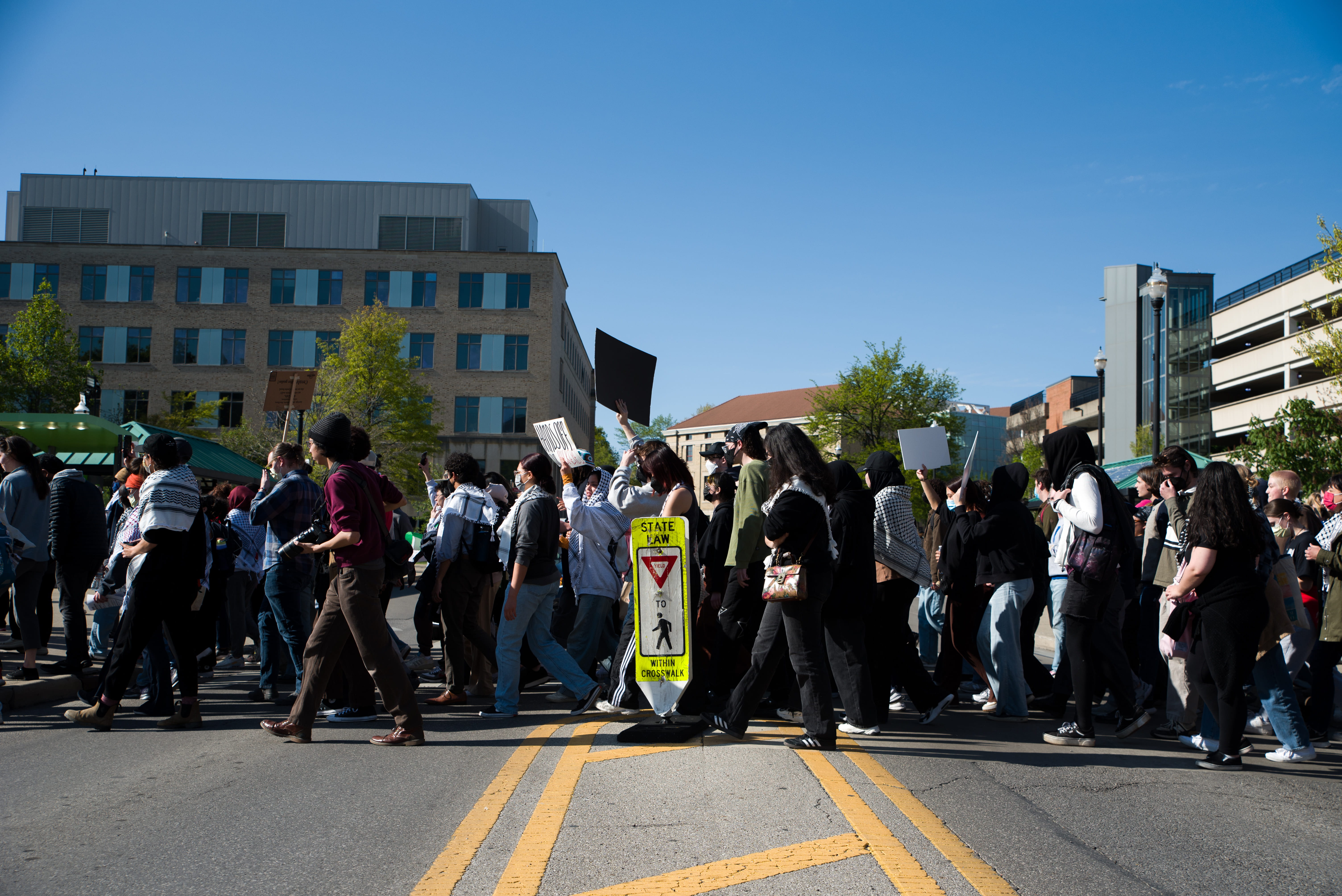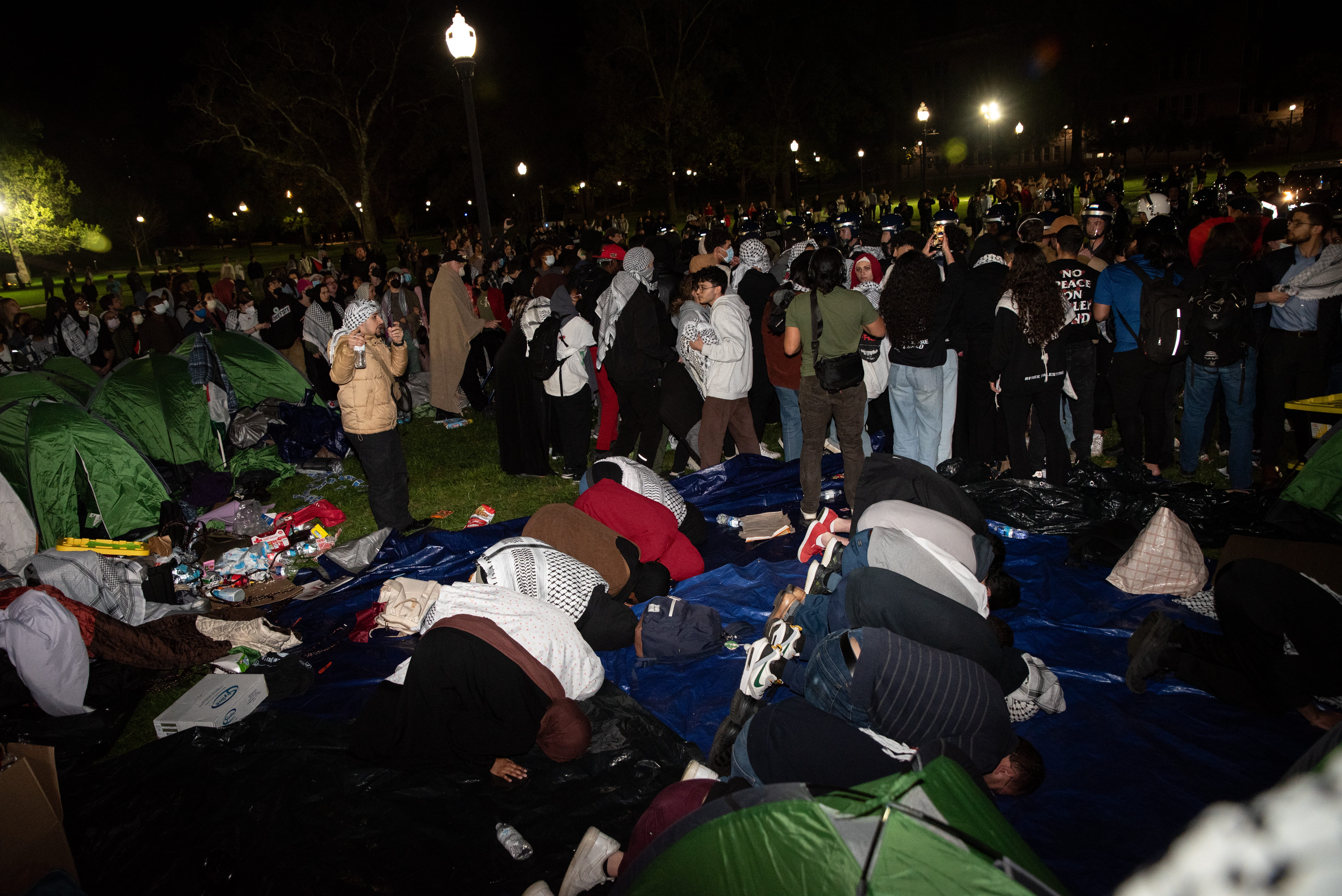
Students, faculty and community members gather to protest the war in Gaza and recent student arrests at the South Oval Thursday. Credit: Christian Harsa | Senior Lantern Reporter
Forty-one people — including 19 students — were arrested at on-campus protests against the war in Gaza this week.
Alongside students and community members who have resisted warnings from law enforcement to vacate, university faculty have supported the protesters at the scene or from afar. Several faculty members, including Treva B. Lindsey — a professor in the Department of Women’s, Gender and Sexuality Studies — have called upon university President Ted Carter Jr. to reevaluate the university’s response to recent campus protests.
Carter has not made a public statement on the arrests as of Saturday afternoon.
After attending the protest Thursday night that resulted in 36 arrests, Lindsey said she felt it was necessary to support student’s safety and the message against the war in Gaza.
“I think it’s important that we as teachers — who are here to inform, to support, to advise, to engage and to learn with and from our students — that we be present here in this space for that kind of engagement,” Lindsey said. “I think another job of mine as a professor is to be invested in the safety of the folks here, and I think insofar as my students’ safety is in danger, I should be present here, both as a witness and as someone who is documenting this for someone who is attempting to hold our law enforcement accountable for when they overstep.”
Lindsey said the university’s decision to arrest was a “gross miscalculation” and compared it to historical crackdowns on student activism, such as protests during the Civil Rights movement in 1968. She said college is meant to allow students to think critically and change the world, but policing makes these processes more difficult.
“I think our institution is not only taking a politically incorrect position, [but a] morally unjust position in response to their own students,” Lindsey said.
Ashley Perez, an assistant professor in the Department of Comparative Studies, said she attended the first encampment attempt Thursday morning after seeing the protest being responded to “so forcefully” and hoped that her presence would help alleviate some of the situation’s tension.
Perez said she saw student protesters respond to every request from officers since the encampment began, including taking down tables and removing tarps, food items and blankets. Despite this compliance, Perez said they were still asked to disperse.
“That response really does violate long-standing precedents for students to have the opportunity to express their views peacefully on public university campuses, so there’s both their effort to comply with concerns about their space use — which none of which were met with anything but further restrictions — and then secondly, the fact that even if they hadn’t been willing to adjust their presence in the ways that they were being asked to do, student speech is protected, including during exam week,” Perez said.
Perez witnessed the first arrest of a protester Thursday morning and said it felt like an “intentional act of intimidation,” and that the actions of the police violated the ability of students to exercise their First Amendment rights.
“The recurrence to use some of these space rules, it seems to me not respectful of the broader principles of free speech because it is the mandate of Ohio State University to support students and education for global citizenship,” Perez said.
Perez said the administration’s decisions show a failure to recognize student protesters as students and members of the Ohio State community.
“The repeated insistence that if they want to say something they should be saying it in a different way or somewhere else, or at another time, ultimately does not acknowledge how protest works. Protest is an intervention. It is having a presence at a time and a place where one can be seen and heard,” Perez said. “I would call the president and the leadership of Ohio State to reconsider its relationship to student protesters and to recognize that theirs is a call to conscience. They are protesting the deaths of more than 30,000 people in Gaza, many of whom are women and children — civilians. That is a serious call to conscience, and it should be taken seriously.”
In the following hours, Perez sent a letter criticizing the arrests to Carter.
She hasn’t heard back.
The letter implored Carter to treat students as members of Ohio State and allow students the ability to speak without fear of arrest.
“I trust the sincerity of President Carter’s assertion of his commitment to the First Amendment, but what actions we saw were far from upholding what freedom of speech and the First Amendment [call for],” Perez said. “So what I believe is essential from Ohio State administration is a clear recognition that these actions were not honoring students’ First Amendment rights, nor were they honoring students’ important work in the university.”

While law enforcement advance on the student protesters, a dozen people kneel in prayer within the circle of demonstrators surrounding them. Credit: Christian Harsa | Senior Lantern Reporter
Lindsey said it is important for the administration to take accountability for the actions of Thursday evening.
“It’s the first test [of Carter’s administration], and I think they’re really trying to pass the buck over the student life to [Ohio State police]. But this is his administration,” Lindsey said. “This is an important part of the legacy that he will leave, and we’re seeing this with presidents across the United States, that their knee-jerk reaction to this rise in student activism has largely been repression. And I think that that again shows us that these institutions are far too complicit not only with what’s happening abroad but the kind of repression that’s present on our own campuses.”
Although Carter has not made any public address, the university released a statement Thursday shortly before midnight regarding the arrests.
“Well-established university rules prohibit camping and overnight events. On Thursday, April 25, demonstrators, a number of whom were not students, faculty or staff at Ohio State, exercised their First Amendment rights for several hours and were then instructed to disperse. Individuals who refused to leave after multiple warnings were arrested and charged with criminal trespass,” the statement said. “Arrests are not an action that we take lightly, and we appreciate the support of all of our law enforcement partners to disperse the encampment for the safety of our university community. We have always, and always will, take the action that is in the best interest of our community.”
The day before Tuesday’s arrests, Carter sent an email to the university community acknowledging the conflicts seen on college campuses nationwide and maintaining his commitment to free speech.
“I want our students, faculty and staff to stand up for what you believe in — to have a voice and to use that voice,” the email stated. “We must dedicate ourselves to using our voices with civility and compassion. Our motto is ‘Education for Citizenship,’ and respectful debate is at the heart of our democracy.”
Carter then reiterated the university’s commitment to safety, including having university police present at demonstrations and the enforcement of the university’s space rules.
“I remain steadfastly committed to maintaining an environment where all members of our community feel welcome while continuing to uphold the First Amendment and the laws of our state and nation,” the email continued. “Ohio State will continue to prioritize safety, including having university police and trained staff on-site for student demonstrations. We will also consistently enforce our space rules, which do not allow for intentional disruptions of university events, classes, exams or programming, including commencement.”
Similarly, Carter noted he will not compromise enforcing these policies when speech turns to incitement or threats of violence.
In an interview with The Lantern on April 10, Carter said the university is happy to speak with student groups about protest guidelines and what types of demonstrations are protected.
“I have been a proponent of free speech, the Constitution, the First Amendment since the day I raised my hand to take my commission in 1981,” Carter said. “So, I’ve lived a life of understanding what it means to support those to have a voice. And I bring that here. So, I believe strongly that not only should everybody have a voice, they should know their voices are heard. Those are two different things.”
Before three arrests in the South Oval on Thursday morning, demonstrators attempting to set up an encampment said they asked to speak with university administration. Ohio State declined that request, according to Jeremy Strickland, a member of the Columbus Democratic Socialists of America.
Since Thursday, at least 10 faculty members in the Department of Sociology have also signed a letter to Carter and Senior Vice President for Student Life Melissa Shivers, calling upon university leaders to allow students to engage in peaceful protests without regard to their subject matter, protect students protesting from disciplinary action and encourage the dismissal of charges of the students arrested.
“University and college campuses are, or should be, bastions of democratic process, the exercise of free speech, and intellectual exchange,” the letter states. “The especially aggressive stance and presence of police, seemingly supported by OSU’s administration, fly directly in the face of such principles. Indeed, the decision to arrest these students is in direct violation of our community’s shared values, particularly Ohio State’s self-stated mission ‘to prepare a diverse student body to be leaders and engaged citizens.’”
After witnessing some of the initial arrests and learning of those that followed, Perez said she did not understand how the protesters disrupted the university’s functions. She believes that no one’s ability to study or learn on campus was infringed upon by the protesters.
Perez said it is vital for students and faculty to look at Thursday’s events and to ask themselves if this is an atmosphere members of the university community want for Ohio State.
“I think it’s a wake-up call to all of us to not take for granted our ability to gather, to speak, to write in alignment with our convictions, and that’s why I think right now, it’s so important for faculty, for students to witness what happened to peaceful protesters last night and yesterday, to watch those videos, to imagine themselves or their sibling or their child or their friend being treated as those protesters were and ask, ‘Is this what we want for Ohio State?’” Perez said. “And if it’s not, we need to send that message to Ohio State leadership, and we need to show in our actions in solidarity with these protesters that that is not what ‘Buckeye’ stands for.”


